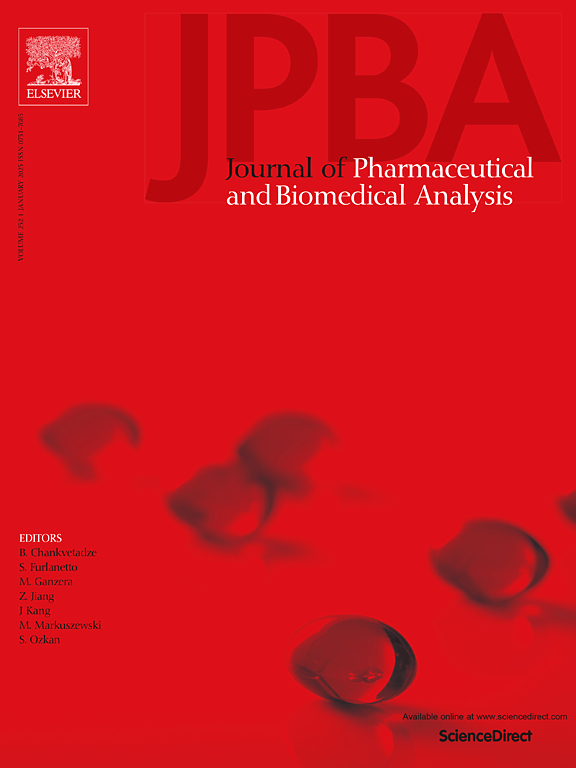代谢组分析揭示了海参中的岩藻糖基化硫酸软骨素在调节代谢平衡方面的潜力
IF 3.1
3区 医学
Q2 CHEMISTRY, ANALYTICAL
Journal of pharmaceutical and biomedical analysis
Pub Date : 2024-10-10
DOI:10.1016/j.jpba.2024.116509
引用次数: 0
摘要
在这项研究中,我们制备了四种岩藻糖基化硫酸软骨素(FCS)的衍生物:来自 Holothuria leucospilota 的全长 FCS(flFCS)、从 flFCS 衍生的低分子量 FCS(lmFCS),以及通过受控酸处理制备的去支链对应物:去支链 flFCS(d-flFCS)和去支链 lmFCS(d-lmFCS)。在使用各种分析技术进行结构验证后,我们应用靶向代谢组学研究了FCS对营养功效的影响及其结构-活性关系。对 75 只小鼠的 225 份血浆和粪便样本进行的分析表明,代谢组学变化与体重增加之间存在正相关,这凸显了 FCS 增强营养吸收和促进生长的潜力。观察到的血浆和粪便中短链脂肪酸水平之间的线性关系表明,FCS 可能会促进胃肠道中的分解代谢活动。通过比较研究不同 FCS 衍生物对小鼠生长和代谢平衡调节的影响,得出的结论是,FCS 的支化程度越高、分子量越大,其生物活性越强。本文章由计算机程序翻译,如有差异,请以英文原文为准。
Metabolomic analysis reveals the potential of fucosylated chondroitin sulfate from sea cucumber in modulating metabolic homeostasis
In this study, we prepared four derivatives of fucosylated chondroitin sulfate (FCS): full-length FCS (flFCS) from Holothuria leucospilota, low molecular weight FCS (lmFCS) derived from flFCS, and their de-branched counterparts, de-branched flFCS (d-flFCS) and de-branched lmFCS (d-lmFCS) via controlled acid treatment. Following structural verification using various analytical techniques, we applied targeted metabolomics to examine the impact of FCS on nutritional efficacy and its structure-activity relationship. Analysis of 225 plasma and feces samples from 75 mice revealed a positive correlation between metabolomic shifts and increased weight gain, underscoring FCS’s potential to enhance nutrient absorption and promote growth. The observed linear relationship between the levels of short-chain fatty acids in plasma and feces suggests that FCS may facilitate catabolic activities in the gastrointestinal tract. The comparative study of different FCS derivatives on mouse growth and metabolic homeostasis regulation led to the conclusion that FCS exhibits greater biological activity with a higher degree of branching and larger molecular weight.
求助全文
通过发布文献求助,成功后即可免费获取论文全文。
去求助
来源期刊
CiteScore
6.70
自引率
5.90%
发文量
588
审稿时长
37 days
期刊介绍:
This journal is an international medium directed towards the needs of academic, clinical, government and industrial analysis by publishing original research reports and critical reviews on pharmaceutical and biomedical analysis. It covers the interdisciplinary aspects of analysis in the pharmaceutical, biomedical and clinical sciences, including developments in analytical methodology, instrumentation, computation and interpretation. Submissions on novel applications focusing on drug purity and stability studies, pharmacokinetics, therapeutic monitoring, metabolic profiling; drug-related aspects of analytical biochemistry and forensic toxicology; quality assurance in the pharmaceutical industry are also welcome.
Studies from areas of well established and poorly selective methods, such as UV-VIS spectrophotometry (including derivative and multi-wavelength measurements), basic electroanalytical (potentiometric, polarographic and voltammetric) methods, fluorimetry, flow-injection analysis, etc. are accepted for publication in exceptional cases only, if a unique and substantial advantage over presently known systems is demonstrated. The same applies to the assay of simple drug formulations by any kind of methods and the determination of drugs in biological samples based merely on spiked samples. Drug purity/stability studies should contain information on the structure elucidation of the impurities/degradants.

 求助内容:
求助内容: 应助结果提醒方式:
应助结果提醒方式:


